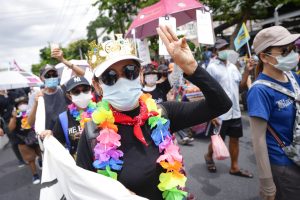Protesters in Thailand returned to the streets today to mark the anniversary of the constitutional revolution that ended the absolute monarchy in 1932 and resume their calls for the resignation of Prime Minister Prayut Chan-o-cha.
The demonstrations began before dawn at Bangkok’s Democracy Monument, where protest leaders read out the declaration proclaiming the end of absolute monarchy by the People’s Party 89 years before. Later, thousands turned out across the capital to press three main reforms: Prayut’s resignation, reforms to Thailand’s military-drafted constitution, and the removal of 250 military appointees from the Senate.
Against the backdrop of a heavy police presence, demonstrators yelled “Prayut, get out” as they made their way to Parliament House. Many flashed the three-finger democracy salute, while others carried replicas of a brass plaque commemorating the 1932 revolution, which was removed from a public plaza in April 2017 and has become a symbol of the pro-democracy movement.
Today’s protests came amid ongoing parliamentary discussions about possible amendments to Thailand’s military-drafted constitution, including changes to the country’s electoral system. On Tuesday, members of the Senate and the Lower House voted to endorse a bill that would pave the way for a public referendum on amendments to the constitution.
Constitutional change and the resignation of the current government are among the primary goals of the youth-led pro-democracy movement, which gained considerable momentum in mid-2020 before peaking late last year, when hundreds of thousands of people took to the streets in towns and cities across Thailand.
Activists allege that the military-drafted constitution was instrumental in helping Prayut, who led a military coup in 2014, to launder five years of military rule into a form of nominally civilian government. “The constitution must come from the people,” protest leader Jatupat Boonpattararaksa, told a crowd today. “In 89 years since the end of absolutism we have not got anywhere.”
The protests also saw open demands – unprecedented in recent Thai history – for reforms to the Thai monarchy, which is placed beyond the boundaries of political scrutiny by the country’s infamous lese majeste law. Those found guilty of violating Article 112, as the law is known, face prison terms of up to 15 years for each count.
In response, the government cracked down hard on those who organized the protests. Beginning in November, it began charging dozens of protest leaders and demonstrators with sedition and lese majeste. According to the advocacy group Thai Lawyers for Human Rights, 100 people currently face lese majeste charges, the overwhelming majority of which “have stemmed from online political expression and the participation in peaceful pro-democracy demonstrations that took place between August 2020 and March 2021.”
For this reason, and amid several more serious outbreaks of COVID-19, the protest campaign went into hiatus in March. Protest leaders say they expect to draw fresh support from citizens frustrated with the government’s handling of the outbreaks and its glacial vaccine rollout. Despite kicking off a mass vaccination campaign on June 7, just 5.49 million people – around 7.86 percent of the population – have received at least one jab.
The protest took place the same day as lawmakers from the ruling Palang Pracharath Party (PPRP) and opposition parliamentarians are expected to vote on the first reading of their proposed amendments to the constitution, which include changes to election rules.
While discussions on overhauling the constitution began late last year to placate the protest movement, significant changes are unlikely any time soon. Even then, they will likely fall far short of what protesters are demanding.
Despite endorsing a referendum, the parliament is likely to spend the next several months wrangling over minor charges that don’t require a public endorsement, while many of the most radical proposals demanded by protesters – including curbs to the power of the monarchy and the overhaul of the military-appointed Senate – have already been ruled out by lawmakers.
According to some observers, Prayut may be hoping to buy time until he can dissolve parliament and call a snap election in the middle of next year, hoping that a successful vaccine rollout and economic reopening – as well as a large injection of economic stimulus – could grant him a fresh popular mandate.
But his government’s strategy of sidestepping the most important demands of the pro-democracy demonstrations while wielding the law against its leaders will do nothing to resolve the grievances that led them to take to the streets in the first place. All this suggests that COVID-19 or no, street politics will remains a central part of Thai politics for the foreseeable future.

































